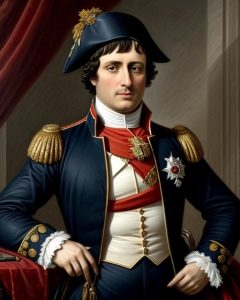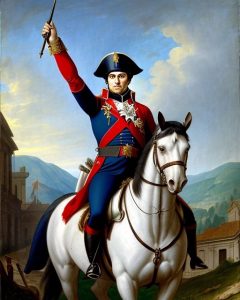Transport yourself back to the late 18th century and allow me to acquaint you with an individual whose presence left an indelible mark on the pages of history. Meet Napoleon Bonaparte, a name synonymous with power, ambition, and military brilliance. Born in 1769 on the captivating island of Corsica, Napoleon’s destiny as an exceptional leader was evident from an early age. His extraordinary military prowess and strategic mindset set him apart from his fellow contemporaries.
In the year 1799, Napoleon seized power through a daring coup d’état, propelling himself to the esteemed rank of First Consul of France. Yet, contentment eluded him as he took the world by surprise, proclaiming himself Emperor in 1804. This audacious move proved to be a turning point in European history. What followed was a reign characterized by unparalleled military conquests and profound political reforms.
With unwavering determination, Napoleon expanded the boundaries of the French Empire, firmly establishing control over extensive territories across continental Europe through meticulous military campaigns. His mastery of groundbreaking tactics, such as artillery and the renowned Grande Armée’s organization, led to a series of resounding victories.
However, as is often the case with exceptional figures, Napoleon’s ambition ultimately contributed to his own downfall. His ill-fated invasion of Russia in 1812 served as a pivotal moment, followed by subsequent military defeats in the Peninsular War and the decisive Battle of Waterloo. Needless to say, these defeats resulted in his abdication and subsequent exile to the remote island of Saint Helena, where he spent his final days until his passing in 1821.
Nevertheless, Napoleon’s profound legacy endures, casting a long and influential shadow over the annals of history. Undoubtedly, his impact on France and Europe is immeasurable. The Napoleonic Code, a revolutionary legal and administrative framework introduced by him, laid the foundation for modern legal systems around the world. Furthermore, his advocacy for religious toleration, transformative developments in education, and support for scientific research reshaped society’s fabric.
Napoleon’s military campaigns and extraordinary strategic acumen forever altered the nature of warfare, significantly influencing tactics and strategies for generations to come. Even today, he remains a complex and enigmatic figure, revered by admirers for his remarkable achievements, while critics scrutinize his authoritarian rule. Regardless of one’s perspective, it is undeniable that he has left a profound and enduring impact on the world, firmly securing his place as a central figure in the annals of history.


